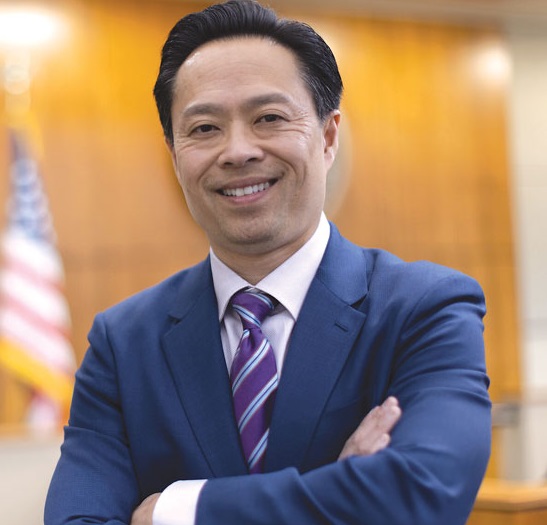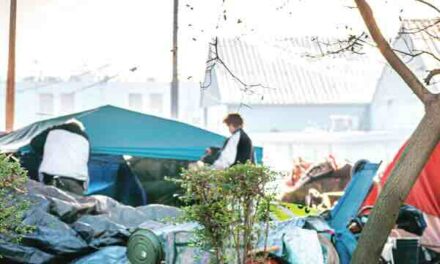‘People Do Not Feel Safe’
New district attorney makes homelessness, crime priorities
By Cecily Hastings
February 2023
Thien Ho has a mandate. The new Sacramento County district attorney was elected last year by a landslide, defeating Alana Mathews by more than 43,000 votes. Now comes the hard part. Ho must deliver on a promise to make the community safe again.
In a wide-ranging interview before he took office in January, Ho told me his experience as a prosecutor and legacy as an immigrant will guide him through challenges that await.
“We face two huge issues in our community right now,” he says. “No. 1, without a doubt, is the homeless crisis. And second is gun violence. Whether it’s the shootings that happened Downtown, or in other parts of our county, violent crime is escalating.

“These two issues are my top priority. My other priorities are the increase in theft on every level, and the increase in human trafficking that occurs in different parts of our county.”
The district attorney’s office’s job is prosecuting criminals. From Ho’s perspective, this means more than guilty verdicts and jail sentences. It means building trust across the county’s diverse neighborhoods.
“The justice system needs to work for all,” he says. “The truth is, people do not feel safe where they live or work, or where they raise their children. That is a huge challenge for society. To me, this is the opportunity to right things like this that have gone seriously astray in recent years.”
Ho’s story helps explain his motivation. He says, “I was born and raised in South Vietnam during the war. After the fall of Saigon in 1975, my family was hunted. So my father organized an escape plan for my mom and sister and me in the middle of the night in a small boat. Numerous times we barely escaped capture and death. It was an experience that shaped my entire life.”
Those early years left Ho with a bleak view of authoritarian governments such as the one that won control in Vietnam. “Communism has never worked anywhere it has been practiced,” he says. “It is a political structure that requires extreme authoritarian to stay in power. It denies freedom of speech, voting rights, religious liberty, women’s rights. It only enriches those in power.”
Ho is a Democrat but considers himself conservative when it comes to public safety. “I generally believe the government should stay out of people’s lives,” he says. “I’m an immigrant, a refugee. I know what it’s like to be poor and to have nothing. I know what it’s like to be a victim of crime. But I also know the intricacies of working within the system to make sure that all voices of our justice system work.”
Ho succeeds Anne Marie Schubert, who left office after two terms to run for California attorney general, a race she lost. Schubert emphasized her disapproval of Propositions 47 and 57, voter-approved state measures that reduced criminal penalties.
Ho shares his former boss’ frustration: “Decriminalizing drug use and the evisceration of some of the drug courts brought predictable outcomes that we now see play out on the streets with homelessness and untreated drug addiction.”
He continues, “Homelessness is a complex problem. We have a small population of single mothers without jobs and veterans suffering from PTSD. For those sub-populations, there are a lot of services that have been very effective. But chronic homelessness is most often caused by underlying mental health issues and drug addictions.”
The district attorney mentions synthetic methamphetamine smuggled from Mexico that “causes psychosis with just one use.” He says, “Prop. 57 took away our ability to leverage essentially required treatment, especially for those that engage in criminal activity. It took away one of the most important tools—court-ordered treatment—from our toolbox.”
Last year, Ho toured the open drug market of San Francisco’s Tenderloin. He was joined by developer Mark Friedman, County Supervisor Rich Desmond and Sheriff Jim Cooper.
“We spoke to Tom Wolf, who was a homeless drug addict living on the streets after losing his family. He spent every day in a doorway getting high,” Ho says. “As we looked over and saw drug dealers lined up on one side of the street and the addicts on the other, Wolf explained that he was a mule. He was finally arrested and served 90 days in jail where, off drugs, he was able to clear his head. Wolf was offered and accepted treatment rather than being released back on the streets.”
The field trip confirmed Ho’s dislike for “housing first” strategies used in San Francisco and Sacramento to address homelessness. “It is a federal policy that aims to deliver housing without requiring drug-addiction or mental health treatment,” Ho says. “And it fails every time despite millions in spending.
“The most successful programs in our county, including the Salvation Army and Saint John’s Program for Real Change, require abstinence and offer treatment programs. If a person is not in their right mental state—either emotionally, mentally, physically, or are drug addicted—it will not work. We’ve seen it again and again.”
Despite the failures of “housing first,” Ho recognizes the need to get people off the street. Public safety depends on it.
“Homeless people were burrowing encampments in the levees, which creates a huge flood risk,” he says. “Then COVID hit and the expanded public health order stopped us from clearing camps. Then came zero bail. The last two years have been the perfect storm for this crisis. We are now the fastest growing homeless population in the state, surpassing San Francisco.”
Despite the challenges, Ho insists he can succeed. He’s encouraged by recent collaboration between the city and county on homelessness, and plans to bring municipal departments together in a homeless summit.
He mentions a River District program that gives homeless people gift cards to pick up trash. “Several folks in the program told me they are, for the first time, optimistic about their own future. One man discovered the power of work on his self-esteem, and now plans to make further changes to get back into society,” Ho says.
It’s a small success. But we need thousands of small successes, backed by effective policies and clear-minded leaders, to resolve the biggest crisis in our community.
Readers ask how they can contribute to Inside Sacramento. Here’s how. Visit insidesacramento.com and sign up for our weekly newsletter. Also consider a paid membership starting at $19.95 a year. Every little bit helps us serve our community.
Cecily Hastings can be reached at publisher@insidepublications.com. Follow us on Facebook and Instagram: @insidesacramento.














